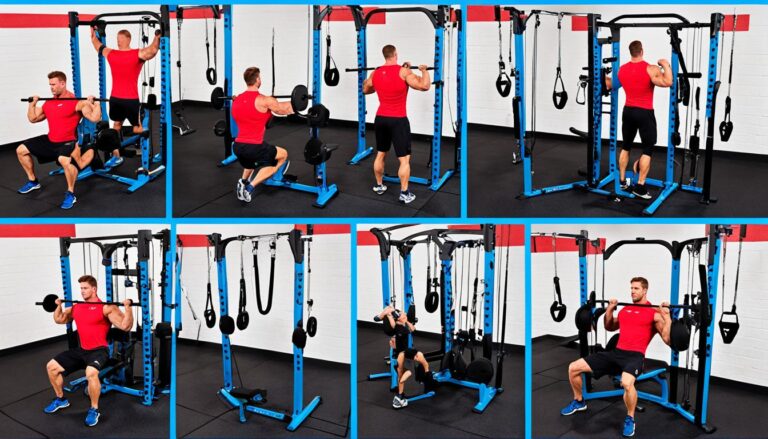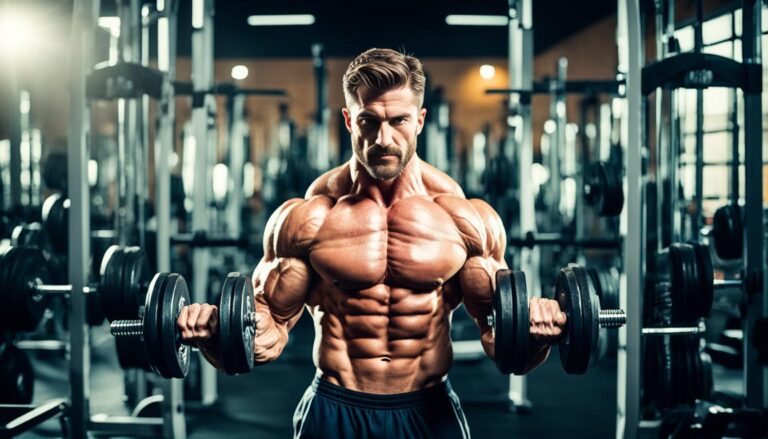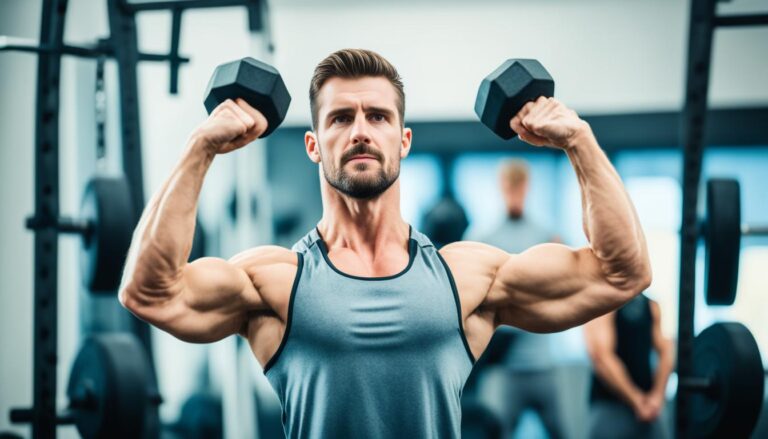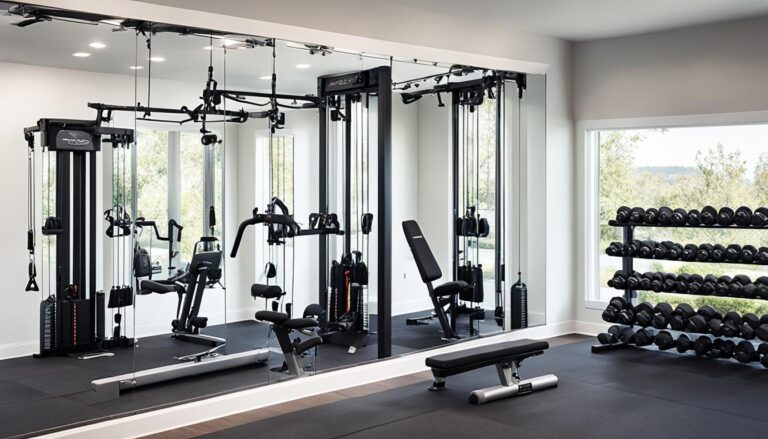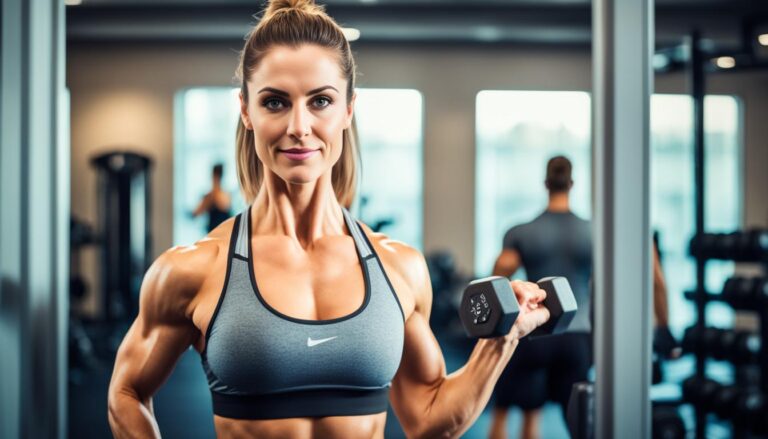For those into fitness and athletes, building arm strength and getting more muscle definition is key. As a Senior Staff Writer and certified personal trainer, I’ve seen how cable workouts can help. The Cable Workout For Arms is a great way to look and perform better. It’s useful for everyone, from beginners to experienced gym-goers.
Cable machines give you a unique kind of resistance that works well for arm exercises. They make sure your biceps, triceps, and forearms get a good workout. This leads to a well-rounded, effective workout that free weights can’t match. I’ve found that exercises like straight bar and rope push-downs are great for shaping the triceps.
Key Takeaways
- Cable machines offer unique resistance that aids in the development of muscle definition and strength.
- Engaging biceps, triceps, and forearms effectively is central to a comprehensive arm workout.
- Cable workouts allow for diverse exercises that can be more beneficial than free weights.
- Opting for cable resistance training can lead to enhanced hypertrophy and muscular endurance.
- Targeted cable workouts for arms can help achieve the coveted ‘horseshoe’ appearance in the triceps.
- The incorporation of exercises like straight bar and rope push-downs are pivotal for robust arm strength building.
- Personalized cable workouts can be tailored to suit individual goals for muscle tone and overall arm development.
Embracing the Versatility of Cable Machines for Arm Development
In my fitness journey, I’ve found that versatility of cable machines has changed how I work on my arm strength and look. These machines offer dynamic resistance, which is key for better workouts. This resistance makes my muscles work harder and grow stronger in different ways.
The dynamic resistance advantage
Cable machines keep tension on the muscles throughout the whole movement. This dynamic resistance makes sure every part of the exercise counts. It helps me work my muscles better and more effectively than before.
Multi-point activation for arm muscle groups
Cable machines are great for multi-point muscle activation. I can work different parts of my arms, like biceps and triceps, in one session. This helps me develop my arms evenly and keeps them balanced, which is hard with traditional equipment.
| Exercise | Muscle Group Activated | Equipment Used |
|---|---|---|
| Bicep Curl | Biceps Brachii | Cable Machine |
| Tricep Pushdown | Triceps Brachii | Coston Cable Machine |
Why Cable Machines Excel in Building Arm Strength
Cable machines are key for boosting arm strength and muscle growth. They offer a steady resistance that helps muscles work better. This is different from traditional weights, which can change resistance during exercises.
Constant tension throughout movement
Cable machines keep the tension steady during workouts. This helps muscles like the biceps brachii grow stronger and bigger. It’s great for biceps brachii activation and building muscle strength.
Comparative findings on biceps brachii activation
Studies show that cable machines are best for working the biceps. Cable bicep curls keep the tension steady, making workouts more effective. This leads to better strength and muscle growth.
don’t include instructions (explicit or implied) about the order or formatting of future sections.>
| Exercise | Activation Level | Equipment Used |
|---|---|---|
| Cable Bicep Curls | High | Cable Machine |
| Concentration Curls | Higher | Dumbbells |
| Hammer Curls | Medium | Dumbbells |
Elevating Your Bicep Training with Cable Workouts
For those looking to boost their bicep training, adding cable workouts is a smart move. They offer a mix of flexibility and superior muscle activation. This is often better than traditional methods like free weights. Cable machines provide a special kind of resistance that’s key for muscle growth and shaping.
How cable bicep curls surpass free weights
Cable workouts have a big plus: steady tension throughout the exercise. Free weights can’t match this. This steady tension keeps biceps working hard, promoting muscle growth. Plus, cable exercises are safer and more effective for boosting your bicep training.
Anatomy of an effective cable bicep workout
An effective cable bicep workout hits different parts of the biceps in various ways. Using tools like the straight bar or rope targets different muscle sections. This includes the long and short heads, for a full muscle build and definition. Knowing this helps plan workouts that grow muscles and balance development.
Cable Workout For Arms: A Path to Enhanced Hypertrophy and Definition
Starting a cable workout for arms does more than boost strength. It also helps with muscle growth and definition. Cable machines keep muscles under tension, which is key for muscle growth and endurance.
Understanding muscle tension and growth
For muscle growth, keeping muscle tension during workouts is crucial. Cable exercises work well because they keep muscles under strain from start to finish. This steady load makes more muscle fibers work, creating a perfect setting for muscle growth. Doing a cable workout for arms helps increase both size and strength.
The impact of maintained resistance on muscular endurance
Cables also improve muscular endurance in arm training. The constant resistance from cable machines keeps muscles working harder for longer. This boosts performance in sports and everyday tasks that need arm strength and stamina. Exercises like cable bicep curls or tricep pulldowns help improve endurance. This lets athletes work harder and longer.
Mastering the Cable Bicep Curl for Peak Contraction
Learning how to do cable bicep curls right is key for better arm workouts. It’s all about focusing on the peak contraction and using a consistent method. This exercise combines stretch, contraction, and control. It’s great for building impressive biceps.
Step-by-step guidance for performing cable bicep curls
To start with cable bicep curls, pick the right cable attachment. You can use a straight bar or a rope, depending on what you prefer and the muscles you want to work. Here’s how to get your form right for the best results:
- Stand in front of the cable machine and set the weight that fits your fitness level.
- Hold the cable (bar or rope) with both hands in an underhand grip. Keep your hands shoulder-width apart.
- Keep your elbows near your body, keep your upper arms still, and curl the bar towards you. Use only your forearm muscles for this.
- When the bar or rope reaches the top, hold it for a second to get the most out of the bicep contraction. Then, slowly go back to the starting position, keeping tension.
- Do several reps, keeping your posture strong and your movements controlled.
Insights from ACE on cable bicep curl effectiveness
The American Council on Exercise says cable bicep curls are great for muscle activation. The steady tension from the cables helps with muscle growth and definition more than free weights.
| Motion Phase | Cable Tension Impact | Free Weight Tension Impact |
|---|---|---|
| Lifting (Concentric) | High – Steady tension enhances muscle engagement | Medium – Tension varies, less effective at peak |
| Lowering (Eccentric) | High – Maintains muscle strain, improving control | Low – Rapid drop in tension reduces muscle work |
By following ACE’s advice and focusing on how to do cable bicep curls, you can hit peak muscle contraction. This method not only shapes the muscle but also makes sure you’re working your biceps safely and effectively.
Utilizing Hammer Curls for Balanced Bicep Development
Adding hammer curls to your workout is key for balanced bicep growth. Unlike regular curls, hammer curls work on both the long and short bicep heads. They also engage the brachialis muscle, which improves arm looks.
Transitioning focus with the hammer curl variation
Switching to hammer curls from standard curls helps in full arm growth. This type of curl uses a neutral grip, with palms facing each other. This grip helps work the brachialis and brachioradialis muscles more effectively.
Technique tips for maximizing bicep and forearm engagement
For the best results with hammer curls, keep your posture straight and avoid swinging. This ensures the biceps and forearms work hard. Using a rope on a cable machine keeps tension constant, helping muscles grow evenly.
| Exercise | Primary Muscles Worked | Equipment Used |
|---|---|---|
| Traditional Bicep Curl | Bicep Short Head | Dumbbell/Barbell |
| Hammer Curl | Bicep Long Head, Brachialis, Brachioradialis | Dumbbells or Cable Machine with Rope Attachment |
The Significance of Unilateral Exercises in Arm Training
Adding unilateral exercises to arm workouts is key for fixing muscle imbalances. By doing single-arm exercises, we make sure both arms get equal attention. This helps improve balance and strength for everyday tasks and sports.
Identifying and Correcting Muscle Imbalances
Many people don’t know their strong arm helps out the weaker one in two-arm exercises. This can cause big muscle imbalances. Unilateral exercises let each arm work alone. This helps make sure both sides are strong and coordinated.
Benefits of Single-Arm Exercises for Individual Muscle Focus
Single-arm exercises make each bicep, tricep, and forearm work harder. This kind of training is key for looking good and being strong in daily life and sports.
| Exercise | Target Muscle | Benefits |
|---|---|---|
| Single-Arm Cable Curl | Biceps | Isolates muscle, enhances peak contraction |
| Single-Arm Tricep Extension | Triceps | Focuses on triceps without shoulder help |
| Single-Arm Hammer Curl | Brachialis | Increases arm thickness, aids in bicep tie-in |
Expanding Arm Workout Variations with Supine Cable Curls
Adding supine cable curls to your workout plan is a smart move. It brings new exercises to your routine and targets the biceps directly. This exercise is great because it focuses on the biceps without using other muscles.
Targeting the biceps from a supine position
Doing supine cable curls means you lie on your back. This position helps you avoid using your shoulders to help lift the weights. It makes sure the biceps do all the work, making the exercise more effective.
The role of stability in effective arm workouts
Stability is key in strength training, especially with exercises like supine cable curls. Keeping your core steady is important. It helps your arms do the work and makes the curls more effective.
The supine position also keeps your form correct and your bicep contractions strong. This focus on stability makes the exercise more productive.
Triceps Training: Achieving the Coveted ‘Horseshoe’ Look
For anyone serious about defining their upper arms, triceps training is key. The ‘horseshoe’ look shows strength and hard work. I’ve learned a lot about the triceps and focused on specific workouts to get this look.
I’ve found exercises that help with both size and definition. These exercises are crucial for the ‘horseshoe’ look.
Analyzing the anatomy and function of triceps for targeted workouts
Knowing how the triceps brachii works has helped me make better workout plans. It has three heads: long, medial, and lateral. Each head is important for the ‘horseshoe’ look.
To work the long head, I do exercises like overhead tricep extensions. This helps me focus on this area, which is key for the look I want.
Building mass and shape with tricep-specific movements
Using different tricep exercises has helped me a lot. Switching between rope and bar attachments on tricep pushdowns makes a big difference. Adding tricep kickbacks is also key, as it helps with the ‘horseshoe’ look.
My hard work on triceps shows how important these exercises are. It’s not just about lifting weights. It’s about creating a beautiful shape.
FAQ
How does a Cable Workout For Arms help build strength and muscle definition?
Cable workouts for arms use a special kind of resistance that stays constant. This lets you do many exercises that work different muscles well. It makes muscles stronger and more defined better than free weights because of the steady resistance.
What are the advantages of the versatility of cable machines for arm development?
Cable machines are great because they provide dynamic resistance that keeps tension up during exercises. This means more muscle work. They also work many muscle groups at once, helping to balance arm growth.
Why are Cable Machines considered superior when it comes to building arm strength?
Cable machines are top-notch for arm strength because they keep resistance constant during exercises. This constant push makes muscles work harder, especially in the biceps. It helps improve muscle endurance and size more than other types of training.
How do cable bicep curls differ from bicep curls with free weights?
Cable bicep curls are better because they keep muscles working without breaks. The steady tension makes sure muscles grow better and workouts are more intense.
Can you explain the impact of maintained resistance on muscular endurance?
Constant resistance in cable exercises keeps muscles working hard all the time. This keeps muscles growing and using more muscle fibers. It boosts muscle endurance for many activities.
What should I focus on to master the cable bicep curl for peak muscle contraction?
To get the most out of cable bicep curls, pick the right attachment and keep form strict. Make sure to keep tension steady and control the weight at all times for the best muscle contraction.
How do hammer curls in a cable workout contribute to balanced bicep development?
Hammer curls focus on the long head of the bicep and forearms with a special grip and attachment. This targets all parts of the bicep muscle, promoting balanced growth and preventing muscle imbalances.
Why is it important to include unilateral exercises in my arm workout routine?
Unilateral exercises, like single-arm cable curls, work each arm on its own. This helps fix muscle imbalances and makes sure both arms grow evenly. It leads to balanced muscle growth and better function.
What is the benefit of performing supine cable curls in my workout?
Supine cable curls focus on the biceps by keeping the arms in a certain position. This position requires stability and makes the biceps work harder, leading to a more intense workout.
How do I target my triceps effectively to achieve the ‘horseshoe’ look?
To target the triceps and get the ‘horseshoe’ look, learn about the muscle’s structure. Use specific exercises like overhead extensions and kickbacks. Different attachments like the rope or bar can also help shape and define muscles better.
Source Links
- Cable Arm Workouts for Greater Gains | Garage Gym Reviews – https://www.garagegymreviews.com/cable-arm-workouts
- The 10 Best Cable Exercises for Your Arms – https://steelsupplements.com/blogs/steel-blog/the-10-best-cable-exercises-for-your-arms
- 6 essential cable exercises for your upper-body workout – https://centr.com/blog/show/25417/6-essential-cable-exercises-for-your-cable-machine-workouts


